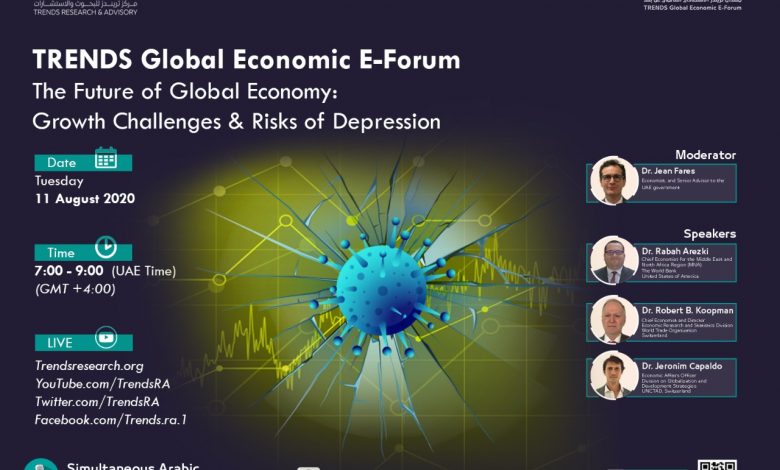Experts, economists highlight global economy’s growth challenges, risks of depression, during TRENDS Global E-Forum
The e-symposium concluded the Global economic E-Forum

ABU DHABI – ![]() :
:
Leading experts and economists participating in an e-symposium highlighted the various growth challenges and risks of depression facing the global economy.
Addressing the concluding symposium – The Future of Global Economy: Growth Challenges and Risks of Depression – as part of the TRENDS Global Economic E-Forum, they tackled the future of the global economy related to its growth trajectories after the Covid-19 pandemic.

Opening the e-discussion, Robert Koopman, the Chief Economist and Director of Economic Research and Statistics Division at the World Trade Organization, pointed to a pattern of economic re-globalization. “The Covid-19 crisis has decimated the global economic markets. Therefore, the recovery will be very weak by all accounts,” he said.
Dr. Koopman also highlighted several avenues of mitigating future pandemics and crises and said that firms, households, and governments would need to evaluate the trade-off between risk and efficiency further. “Firms need to make a lot of adjustments between disrupted supply chains and automation of production while governments need to manage emergency stockpiles better,” he said.
According to Dr. Koopman, this goes hand in hand with healthcare policies such as contact tracing. “On the level of households, we have experienced remote work and the ability to earn an income while practicing social and physical distance, albeit with differences in digital access and privacy concerns,” Dr. Koopman said.
Addressing the symposium, Dr. Rabah Arezki, the Chief Economist for the Middle East and North Africa Region (MENA) at the World Bank, stressed the need to focus on the health response, given the occurrence of the second wave of Covid-19. However, he said that congruently, we need to postpone fiscal consolidation until the time is right.
“There is a great risk of depression after the pandemic as the effect of the crisis on the inflation remains unclear for the time being. Moreover, the unemployment pool has been on the rise,” said Dr. Arezki, adding that to prepare on the recovery, investing in the health sector is the best and the most optimal way forward.
Emphasizing that this is not the right time to do fiscal consolidation, Dr. Arezki said that it makes greater sense to eradicate leaks and increase transparency. “The Gulf countries have done well on digitalization. The competition agenda should be the next step in the post-pandemic period. This might be a good move for attracting more investment,” he said.
Dr. Jeronim Capaldo, an Economic Affairs Officer in the UN Division on Globalization and Development Strategies at UNCTAD, said that the macro-performance had been the fundamental driver of trade, especially when fiscal policies have a different role to play than in the previous crises.
“One way to look at possibilities for recovery is to put work at the center of post-pandemic economic development. We need to organize an entire array of macro-economic policies, and re-organize them around income,” said Dr. Capaldo. He also emphasized the need to sustain spending, which is one of the significant determinants of employment growth.
According to Dr. Capaldo, monetary policy has been flooding the global economy with a lot of credit, which has brought relief to many balance sheets. “Congruently, they have encouraged the short-term illusion of the possibility for recovery. We need to think beyond this, as it might produce financial bubbles, rather than a sustained income,” he said.
He also said that the constraints on financial policies have also led to an unbalanced development of global economies, which has made them unfit to deal with economic crises, including the Covid-19 pandemic. He also underlined the importance of more progressive tax policies. “It influences the ability of some individuals and corporations to accumulate tremendous financial funds is also what enables large investments and rent-seeking; namely, capture,” Dr. Capaldo said.
Delivering the concluding remarks, Director-General of the TRENDS Research & Advisory, Dr. Mohammed Al-Ali, said that the research center assembled 20 well-known experts from major economies, who signaled the various Covid-19 implications on the global economy and evaluated the varying responses to it.
“They made projections about the future of the economy and provided adequate recommendations. TRENDS Global Economic E-Forum will be an annual event. It will continue to discuss the main economic issues and trends facing the global economy,” Dr. Mohammed Al-Ali said.
The next TRENDS event – A Global Anti-Covid-19 Treatment: Between Development Efforts and Regulatory Protocols – will be held on August 26, 2020, at 7 pm UAE time. All sessions of the Global Economic E-Forum were live-streamed via TRENDS YouTube channel and other social media platforms.




